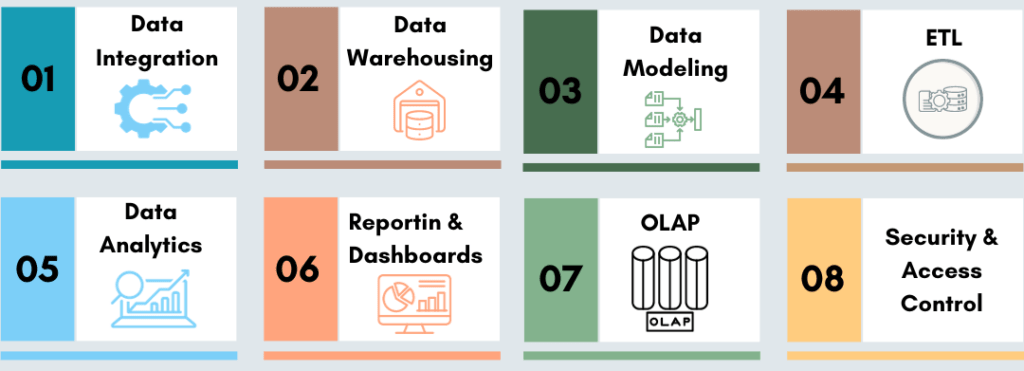
Overview
What is BI outsourcing?
BI outsourcing is a smart partnership between a company and outside experts, specifically for managing the complexities of BI development. Instead of relying solely on an in-house team, BI outsourcing brings in external specialists, creating a diverse team. It’s like building a squad of data experts, each skilled in turning raw data into practical insights. Moreover, this collaboration isn’t just cost-effective; it also speeds up project timelines, giving businesses access to expertise that can take their BI efforts to the next level.
BI outsourcing is more than a service; it’s a team effort to decode data complexities, providing businesses with the strategic intelligence needed for informed decision-making. If you’re ready to turn your data puzzles into victories, BI outsourcing is the smart move for modern business insight.
Top 8 core components of BI services
In the realm of Business Intelligence, Qmantic stands at the forefront, driving a wave of transformative capabilities for advanced analytics and strategic decision-making. Furthermore, as we embark on an exploration of Qmantic-powered BI services, we unveil the pivotal core components that underpin efficiency, innovation, and security. From seamless data integration to robust security measures, each element contributes to a dynamic landscape that propels Qmantic-driven BI solutions to unprecedented heights.

Data Integration
In the realm of outsourcing BI, data integration involves the seamless amalgamation of data from diverse sources, whether internal or external. Outsourced BI providers excel in efficiently combining data from various platforms, ensuring a cohesive dataset that forms the foundation for meaningful analysis.
Data Warehousing
Outsourcing BI data warehousing means entrusting external experts to establish and maintain a centralized database optimized for storage and retrieval. Also, this enables businesses to leverage the expertise of outsourcing partners in managing vast datasets, ensuring scalability and performance.
Data Modeling
When outsourcing BI, data modeling involves collaborating with experts who design the structure and relationships within the data. Outsourced BI providers can ensure that the data model aligns with business objectives, facilitating smoother analysis and reporting.
ETL (Extract, Transform, Load)
Outsourcing the ETL process implies delegating the extraction, transformation, and loading of data to external BI specialists. This ensures a streamlined process, allowing businesses to focus on deriving insights rather than getting bogged down in the intricacies of data preparation.
Data Analytics
BI outsourcing brings advanced data analytics capabilities to the forefront. Outsourced teams leverage statistical and analytical techniques to extract actionable insights from data, providing businesses with a competitive edge in decision-making.
Reporting and Dashboards
With outsourcing, businesses gain access to expertise in creating user-friendly reporting interfaces and interactive dashboards. Outsourced BI professionals design visually appealing and intuitive tools that enhance data presentation and interpretation.
OLAP (Online Analytical Processing)
Outsourced BI services often incorporate OLAP, enabling businesses to perform multidimensional analysis. Additionally, this feature is particularly beneficial for organizations seeking interactive exploration of complex data structures, facilitating a deeper understanding of business trends and patterns.
Security and Access Control
When outsourcing BI, ensuring the security of sensitive data is paramount. Outsourced BI providers implement robust security measures and access controls, safeguarding information against unauthorized access and potential breaches.
What is an in-house team?
An in-house team is essentially a group of individuals who are employed directly by a company and work within the physical confines of the company’s office or designated workspace. These team members are considered integral parts of the organization, contributing to its daily operations, projects, and overall mission. Being under the direct employment of the company, they are subject to its management structure, policies, and work culture. In-house teams often benefit from close collaboration, immediate oversight, and a shared understanding of the company’s goals. Furthermore, the synergy within an in-house team is cultivated through regular face-to-face interactions, team-building activities, and a collective commitment to the company’s success. This is in contrast to external or outsourced teams, which are sourced from outside the organization to fulfill specific roles or projects.
| Criteria | In-House BI Team | Outsourcing BI Developers |
|---|---|---|
| Direct Control and Immediate Oversight | Provides direct control and immediate oversight over projects. | Requires trust in external partners with less direct control. |
| Enhanced Team Integration | Naturally integrates with the company’s culture. | Cultural alignment may vary; integration needs consideration. |
| Communication Efficiency | Enables quick and seamless communication within the team. | Potential communication challenges due to distance or culture. |
| Costs | Higher initial investment and operational costs. | Cost savings on infrastructure and recruitment. |
| Access to Expertise | Limited access to external perspectives and specialized skills. | Access to a global talent pool with diverse BI expertise. |
| Flexibility and Scalability | Limited scalability; team size is fixed. | Offers flexibility in scaling based on project requirements. |
| Communication Challenges | Generally smoother communication due to proximity. | Potential challenges due to time zones or cultural differences. |
| Dependence on External Partners | Independent operation with internal dependencies. | Requires trust in external partners; vendor selection critical. |
Legend:
Pros – Advantages
Cons – Challenges
Choosing between an in-house BI development team and outsourcing BI developers depends on the unique needs and priorities of the business. While an in-house team offers control and cultural alignment, outsourcing provides cost-effectiveness, global expertise, and scalability. In agreement, a balanced approach, such as a hybrid model, could be a strategic choice for businesses aiming to leverage the benefits of both approaches.
In the end, businesses should conduct a thorough analysis, considering budget constraints, project scope, and long-term goals, before deciding on their BI development strategy. Consequently, making an informed decision will set the stage for successful BI initiatives.
Top 5 benefits of outsourcing BI development to Qmantic
Outsourcing BI development to Qmantic provides businesses with immediate access to a pool of highly skilled and specialized experts in the field. Also, this ensures that your project benefits from the latest knowledge, techniques, and best practices in Qmantic technology.

One of the primary advantages of outsourcing is cost efficiency. Businesses can significantly reduce expenses associated with in-house Qmantic development, including recruitment, training, and infrastructure costs. This allows for a more streamlined budget and allocation of resources.

Outsourcing BI development to Qmantic accelerates project timelines. Moreover, with a dedicated team focused solely on your project, tasks can be completed efficiently, reducing time-to-market and ensuring a competitive edge in the rapidly evolving technological landscape.

Outsourcing offers flexibility by allowing businesses to scale their Qmantic development resources based on project requirements. Whether you need to expand or shrink the team, outsourcing provides the agility needed to align with your business needs and project demands.

By outsourcing Qmantic development, businesses can free up their in-house teams to concentrate on core business functions. This strategic allocation of resources ensures that each aspect of the business receives the attention it deserves, fostering overall organizational growth and efficiency.

Conclusion
In summary, BI outsourcing is a strategic collaboration between businesses and external experts, offering an efficient approach to BI development complexities. Qmantic, a BI platform, exemplifies excellence with core components that drive efficiency, innovation, and security.
Furthermore, comparing in-house BI teams to outsourcing BI developers highlights the importance of considering unique business needs. While in-house teams provide control and cultural alignment, outsourcing offers cost-effectiveness, global expertise, and scalability. A balanced approach proves beneficial for businesses aiming to harness both strategies.
To embark on this transformative journey, businesses are encouraged to explore Qmantic’s capabilities through a free trial for a firsthand experience of its benefits. Outsourcing development offers numerous advantages, making it a wise decision.





